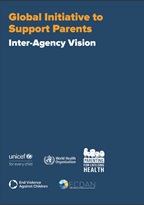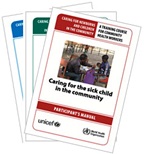Resources for each developmental stage
At all stages
Designing, implementing, evaluating and scaling up parenting interventions: a handbook for decision-makers...
This handbook provides comprehensive advice for policy-makers, practitioners, and stakeholders involved in the development, implementation, and...
Improving the health and wellbeing of children and adolescents: guidance on scheduled child and adolescent...
To survive and thrive, children and adolescents need good health, adequate nutrition, secure, safe and a supportive clean environment, and opportunities...
Mental Health Gap Action Programme (mhGAP) guideline for mental, neurological and substance use disorders
The mhGAP guideline supports countries to strengthen capacity to deal with the growing burden of mental, neurological and substance use (MNS) conditions...
WHO guidelines on parenting interventions to prevent maltreatment and enhance parent–child relationships...
This guideline provides evidence-based recommendations on parenting interventions for parents and caregivers of children aged 0–17 years that are...
Child maltreatment is widespread, but often hidden. Only a fraction of child victims of maltreatment ever tell anyone about what happened to them and very...
Mental Health ATLAS 2020
The Mental Health Atlas, released every three years, is a compilation of data provided by countries around the world on mental health policies, legislation,...
The Global status report on preventing violence against children 2020 charts countries’ progress towards the SDGs aimed at ending violence...
INSPIRE Handbook: action for implementing the seven strategies for ending violence against children
The INSPIRE handbook: action for implementing the seven strategies for ending violence against children explains in detail how to choose and implement...
INSPIRE: Seven strategies for Ending Violence Against Children
INSPIRE: Seven strategies for ending violence against children identifies a select group of strategies that have shown success in reducing violence against...

Global Initiative to Support Parents
Evidence is clear: parents and the environment at home are central pillars in supporting children’s health and development. The quality of parenting...
Antenatal (pregnancy), neonatal and infancy (birth to 11 months)
This document puts forward the joint position and vision of an expert, global, multistakeholder working group on implementing Kangaroo Mother Care (KMC)...
This guideline aims to improve the quality of essential, routine postnatal care for women and newborns with the ultimate goal of improving maternal and...
WHO recommendations on maternal and newborn care for a positive postnatal experience: executive summary
The recommendations in this guideline are intended to inform the development of relevant national and subnational health policies, clinical protocols and...
Early childhood (1-4 years)
Nurturing care practice guide: strengthening nurturing care through health and nutrition services
This Guide responds to requests from practitioners and country teams who have learned about the Nurturing care framework and want to understand...
Improving early childhood development
Enabling young children to achieve their full developmental potential is a human right and an essential requisite for sustainable development. Given...
Operationalizing nurturing care for early childhood development: the role of the health sector alongside...
The Nurturing care framework launched in 2018 summarized the evidence on why nurturing care is essential for young children and what caregivers need in...
Nurturing care for early childhood development
What is one of the best ways a country can boost shared prosperity, promote inclusive economic growth, expand equitable opportunity, and end extreme...

This WHO-UNICEF package "Caring for newborns and children in the community" is aimed at increasing the coverage of household and community...
Early childhood development (ECD) – including the sensori-motor, social /emotional and language /cognitive capacities – is indivisible from the...
Later childhood (5-9 years)
Caregiver skills training for families of children with developmental delays or disabilities - Introduction
This is the first part of a five-part package that provides guidance on caregiver skills training for families of children aged 2–9 years with developmental...
Adolescence
Early Adolescent Skills for Emotions (EASE)
Early Adolescent Skills for Emotions (EASE) is an evidence-based group psychological intervention to help 10–15-year-olds affected by internalizing...
Adolescents are not simply old children or young adults. This deceptively simple observation lies at the heart of Global Accelerated Action for the Health...
Helping Adolescents Thrive Toolkit
This publication, produced by the World Health Organization and UNICEF, has been developed to support the implementation of the WHO Guidelines...
WHO recommendations on adolescent health: guidelines approved by the WHO guidelines review committee
This publication on WHO recommendations related to adolescent health is one of four in a series; the others relate to maternal, newborn and child health....
